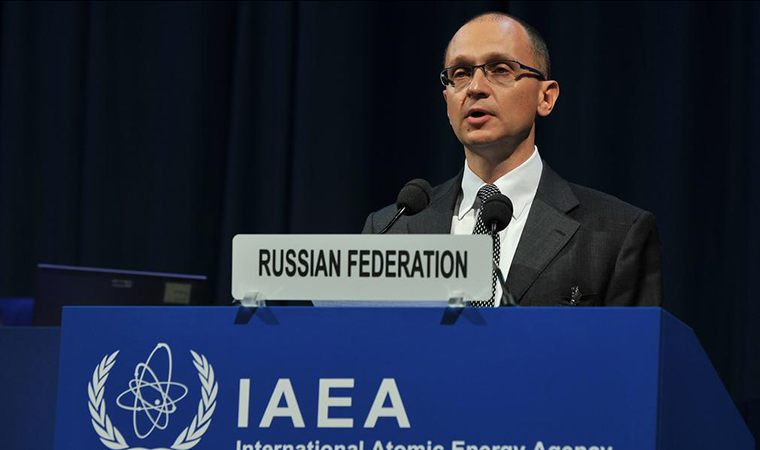
In the focus of attention
back to contentsAt the beginning of his speech at the plenary session, Sergei Kirienko dealt with present-day specifics of the international nuclear cooperation. Despite political challenges, cooperation goes ahead in the ordinary way. Russia stands against attempts to politicize activities of the International Atomic Energy Agency (IAEA). The nuclear power industry should not depend on the political environment, Rosatom CEO Sergei Kirienko said. “Supported by multi-year experience, our firm belief is that the nuclear industry is a strategic area having a long life cycle and prioritizing safety,” Sergei Kirienko stressed. “It is of paramount importance that the IAEA remains a strictly professional community. We strongly oppose any attempts to politicize the Agency’s activities.”
Contribution across all areas
Although Russia experiences economic difficulties, it has not reduced its financial contribution to the IAEA, Sergei Kirienko said. “Our annual voluntary contributions are comparable to the mandatory contribution to the Agency’s budget.” According to him, Rosatom has made a fundamental decision to continue contributions to the IAEA Nuclear Security Fund in 2016–2021.
“We have more than doubled funds for the Russian safeguard support program,” Rosatom CEO stressed and added that Russia “gradually increases contributions to the Technical Cooperation Fund.”
Sergei Kirienko also noted that for the last fifteen years Rosatom had been implementing and financing the INPRO project initiated by Russia. Project members now include more than 40 countries.
Key role
When speaking at the General Conference, IAEA Director General Yukiya Amano said that he puts emphasis on this year’s agreement on the Iranian nuclear program. In July, Iran and six international intermediaries (five permanent members of the UN Security Council and Germany) finished a multi-year effort to settle the Iranian nuclear issue. Its result was the Joint Comprehensive Plan of Action (JCPOA) consisting of a basic agreement and five annexes.
“We adopted the JCPOA to deal with the Iranian nuclear program. Iran and the IAEA agreed on a road map to clarify all the Iranian nuclear issues, which still remain open, until the year end,” noted Yukiya Amano.
Russia’s contribution to the Iranian problem is hard to overestimate as it played a key role in organizing the negotiation process. “We have already started working on practical aspects of the JCPOA. A lot of preparatory work was done, and we hold a series of negotiations with the Iranian partners,” said Sergei Kirienko at the General Conference. Russia and Iran are working on technical aspects of reconfiguring the Fordo Uranium Enrichment Facility, which has long been a stumbling block in the relations between Iran and the West, to produce stable isotopes.
Following the best practices
Sergei Kirienko noted that Rosatom realized its responsibility amid new challenges posed by the expansion of the global nuclear power market. To respond to the challenges, Rosatom has established an engineering division specializing in the design and construction of nuclear power plants. Last year alone, the engineering division put four new reactor units in operation. With nearly 30 companies, the engineering division is capable of manufacturing all the core and auxiliary power generating equipment. “Its capacity is enough to produce up to seven reactors annually,” stressed Rosatom CEO.
Rosatom remains active in international projects and looks for local contractors. “In particular, the share of local contractors in Belarus and Turkey may reach 80% in construction and 50% in installation,” he said.
Rosatom understands that joint cross-border projects in nuclear energy require appropriate finance. This task is a responsibility of both the customer and contractor. “We work with governments, international institutions and institutional investors. We follow the best global practices,” the CEO concluded.
At the scientific forum
It was the first time Rosatom CEO had addressed the scientific forum, this year dedicated to the industrial application of nuclear technologies. “This is very much unusual. People of this rank are rare speakers at the forum,” says Vyacheslav Pershukov, Rosatom Deputy CEO for Innovation Management. “IAEA Director General Yukiya Amano asked Sergei Kirienko earlier this year to make a welcome report on the contribution of nuclear technologies to the industry. This speaks for the level of technological progress in Russia. This is an appreciation of our nuclear innovation policy.”
At the forum, Rosatom CEO Sergei Kirienko spoke about Russian achievements in applying nuclear technologies in non-power industries. In particular, he told the audience about transport safety technologies. “We have a technology enabling us to check railcars for weapons and explosives on the run. We can monitor railcars at speeds of 20–40 km/h accurately and reliably,” explained Sergei Kirienko.
Other applications include the Kondor monitoring device which is installed on a trailer and scans the road surface for the depth of up to 3 meters at a speed of 60 km/h. “Tens of thousands of kilometers have been scanned, and we begin serial production,” Kirienko said.




